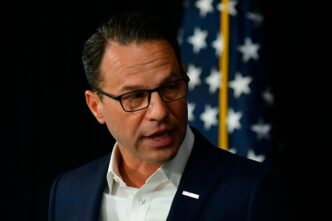Executive Summary
The Story So Far
Why This Matters
Who Thinks What?
Pennsylvania Governor Josh Shapiro criticized President Donald Trump on Tuesday, stating Trump failed both a “leadership test” and a “morality test” in his response to the assassination of Charlie Kirk. Speaking in Pittsburgh after a speech on political violence, Shapiro asserted that Trump’s selective condemnation of violence, focusing solely on the “radical left,” exacerbates societal divisions and risks encouraging further acts of aggression.
Shapiro’s Condemnation of Trump’s Response
Governor Shapiro emphasized that it should not be difficult to denounce individuals who celebrate Kirk’s killing or those who advocate for vengeance, regardless of their political alignment. He argued that such selective condemnation, which Trump has reportedly engaged in by blaming only the “radical left” for violence, inadvertently grants permission for further acts of aggression as long as they align with a particular narrative.
According to Shapiro, this approach only deepens societal divisions, making reconciliation more challenging. He warned that some individuals might interpret such targeted criticism as an endorsement to commit additional violence, provided it serves their agenda or targets opposing factions.
Context and Personal Experience
Shapiro’s remarks were delivered at a gathering of Eradicate Hate, an organization dedicated to combating antisemitism, just days after Charlie Kirk’s assassination. The event also occurred five months after an assailant set fire to the Pennsylvania governor’s mansion hours after Shapiro and his family had celebrated a Passover seder there.
The Democratic governor recounted the terror of being awakened by state troopers following the April attack, and the subsequent support he received from the community. He acknowledged that the incident left emotional scars, particularly as a father of four children, knowing his public role potentially put them at risk.
Addressing Political Violence
Shapiro linked the arson attack on his home to a broader pattern of political violence, including Kirk’s death, an assassination attempt on President Trump last year in Pennsylvania, the killing of a healthcare CEO in Manhattan, and the slayings of Minnesota state Representative Melissa Hortman and her husband in June.
He described political violence as an act that not only seeks to injure or kill but also aims to intimidate, terrorize, and silence. Shapiro stressed that this type of violence has no place in society, irrespective of its motivation or the perpetrator’s identity.
The governor proposed that the solution to political violence requires government action to positively impact people’s lives, coupled with greater awareness of how “righteous frustration is taken advantage of to foment hate” online. He lamented that “what starts with cowardly keystrokes often ends with a trigger being pulled in our communities.”
Bipartisan Call for Unity
Former Republican Governor of Pennsylvania, Tom Corbett, who introduced Shapiro, echoed the sentiment that preventing hate-fueled violence transcends partisan divides. Corbett asserted that it is an issue demanding collective effort from all individuals across the nation and the world.
Shapiro concluded by emphasizing the importance of finding common ground, even amidst political disagreements. He invoked the wisdom of western Pennsylvania native Fred Rogers, encouraging people to “look for the helpers.” The governor expressed his belief in America’s strength over hate, and underscored that the responsibility to combat such violence falls on every individual.








